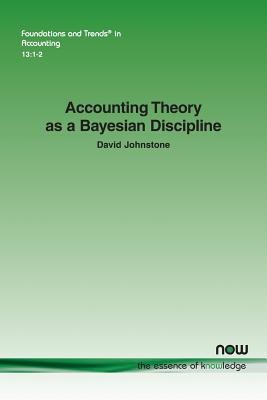
- We will send in 10–14 business days.
- Author: David Johnstone
- Publisher: Now Publishers
- ISBN-10: 1680835300
- ISBN-13: 9781680835304
- Format: 15.6 x 23.4 x 1.5 cm, minkšti viršeliai
- Language: English
- SAVE -10% with code: EXTRA
Reviews
Description
Accounting Theory as a Bayesian Discipline introduces Bayesian theory and its role in statistical accounting information theory. The Bayesian statistical logic of probability, evidence and decision lies at the historical and modern center of accounting thought and research. It is not only the presumed rule of reasoning in analytical models of accounting disclosure, it is the default position for empiricists when hypothesizing about how the users of financial statements think. Bayesian logic comes to light throughout accounting research and is the soul of most strategic disclosure models. In addition, Bayesianism is similarly a large part of the stated and unstated motivation of empirical studies of how market prices and their implied costs of capital react to better financial disclosure. The approach taken in this monograph is a Demski-like treatment of accounting numbers as signals rather than as measurements. It should be of course that good measurements like quality earnings reports make generally better signals. However, to be useful for decision making under uncertainty, accounting measurements need to have more than established accounting measurement virtues. This monograph explains what those Bayesian information attributes are, where they come from in Bayesian theory, and how they apply in statistical accounting information theory.
EXTRA 10 % discount with code: EXTRA
The promotion ends in 22d.15:23:41
The discount code is valid when purchasing from 10 €. Discounts do not stack.
- Author: David Johnstone
- Publisher: Now Publishers
- ISBN-10: 1680835300
- ISBN-13: 9781680835304
- Format: 15.6 x 23.4 x 1.5 cm, minkšti viršeliai
- Language: English English
Accounting Theory as a Bayesian Discipline introduces Bayesian theory and its role in statistical accounting information theory. The Bayesian statistical logic of probability, evidence and decision lies at the historical and modern center of accounting thought and research. It is not only the presumed rule of reasoning in analytical models of accounting disclosure, it is the default position for empiricists when hypothesizing about how the users of financial statements think. Bayesian logic comes to light throughout accounting research and is the soul of most strategic disclosure models. In addition, Bayesianism is similarly a large part of the stated and unstated motivation of empirical studies of how market prices and their implied costs of capital react to better financial disclosure. The approach taken in this monograph is a Demski-like treatment of accounting numbers as signals rather than as measurements. It should be of course that good measurements like quality earnings reports make generally better signals. However, to be useful for decision making under uncertainty, accounting measurements need to have more than established accounting measurement virtues. This monograph explains what those Bayesian information attributes are, where they come from in Bayesian theory, and how they apply in statistical accounting information theory.


Reviews